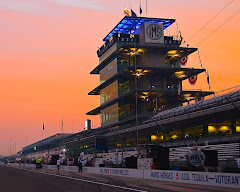I am aware that my writings have been critiqued, once again, by the writer of another blog. Last week, I committed a great deal of time and effort to defending myself against such criticism. That was a mistake, one that I will not make again.
My goal here is to provide credible analysis. Whenever possible, I use empirical data. I have noticed an increased interest in hard numbers. This is likely a case of mere coincidence; it is a good one at that.
I have also attempted to utilize the writings of thought leaders in the fields of marketing, management, and corporate strategy. Anyone can write that "exposure" and "promotion" are needed in IndyCar racing. Everyone knows that costs must be reduced. Such comments are not insightful.
You can promote pickled herring and cut its price as much as youI want an economically competitive IndyCar Series, one that does not require subsidies from governments, arbitraged supply chains, drivers and the Indianapolis Motor Speedway. I am convinced that the present course shall lead to ruin. That is why I want it stopped.
want. The market for it will remain small. Sometimes, the product is the problem.
Disagreement is welcome here. I am not always right. But I am done linking to those who seem interested only in taking pot shots.
Fool me once... you know?
Roggespierre


"R",
ReplyDeleteSome people will always take shots at anyone who might have the gall to suggest that "things are not perfect in paradise".
The IRL has lived on TG and his willingness to spend his families money--hoping that once CART was destroyed all would be well.
The truth is that the IRL at it's birth had the right idea; oval racing with American drivers, and with engines and chassis OWNED by the teams.
But along the way--trying to defeat the enemy--CART--the right idea was discarded---and a duplication of CART (but less effective) was pursued.
Now the entrenched people (Barnhart et al) are about to perpetuate the mistake. The new engine/chassis package will be announced soon.
Want to bet what it'll be?
Please continue your endeavor and let the "pot shot" people shoot away---sooner or later common sense has to set in, and if your thoughts (as I believe they do), make sense, those that have a financial interest will begin to listen.
I believe they already have begun.
People who have raced in open wheel cars are beginning to be vocal in their disgust of what the IRL has become. Except of course for those that are hired and in debt to the teams that employ them.
A flood starts with a single drop of water!
osca
Osca,
ReplyDeleteThank you, sir. Your assessment of the early IRL mirrors mine. It was a good idea - but the organization was not prepared to execute it properly.
I also tend to believe - I have no evidence, so it's just a guess - that the vast majority of the money TG used to "prop up" the IRL was spent between 2003 and 2008.
Bringing everybody back cost TG a lot. And all the while, TV ratings dropped. And make no mistake, it's all about TV ratings.
Thank you for your encouragement and contributions to the site. We'll press on.
Warmest Regards,
Roggespierre
Like the blog and read it almost daily. There's some analysis I like here and I agree in large part about some of the things that need to be done with the sport in order to continue its existence. But since you're seemingly asking for criticism here, heh;
ReplyDelete-Can't agree that the IRL was ever a good idea. Should have taken a seat on the board and run a team with Americans in order to try and divert the direction instead of shooting the whole thing in the head to save it from itself. Its tough to say, after all, that he was a success in saving the 500 if there isn't one, or if it becomes a classics race. Road to hell paved in good intentions and all that.
-I've seen a couple arguments about trying to do redistribution of sponsorship. A lofty goal perhaps but I don't see this as being realistic. Nor do I necessarily see ridding Penske and Ganassi as being a way to solve the problem. Indy without Penske is like F1 without Ferrari at this stage. It was devastating to the legitimacy of the race when they weren't around, even if the US 500 was itself a failure. Which brings me to...
-No one buys that the Americans in the IRL are the best US drivers. Americans don't care if they win because no one believes they're racing world class opposition anymore. No one thinks they're in the toughest series in the world, or that they are better than their peers. This is because they are right: Kyle Busch, Tony Stewart, Jeff Gordon, and Jimmie Johnson are likely the 4 best drivers currently birthed in this country, and none drive Indycars. Fans recognize that and don't want to support a second rate series. Until they shake that (and is there any other way than to bring in NASCAR talent?), there's nothing they can do. Its an image problem that started with the media ridiculing the "stars of the short track" and only built steam when Juan Pablo Montoya denigrated the 500 en route to dominating it.
I should also note: one thing rarely discussed in lieu of all this is that open wheel dirt racing is in a decline. There's far fewer cars that there were 5-10 years ago and dirt tracks are closing down rather than appearing. The World Of Outlaws is trucking along with its sprints and late models, but one look at the number of available entries for midget, sprint, and Silver Crown in 2009 is well down. The entire ladder is broken, not just the top rung.
ReplyDeleteVirtualBalboa,
ReplyDeleteI agree with your view of all forms of racing to a point, yet, how many sprint cars were at Knoxville, Iowa?
Let's say lots--and some of these owners (even Smoke) might be willing to field an IRL car if it could be done with the possiblilty of turning a profit or even breaking even.
I agree that NASCAR has more than a few good American drivers (you mentioned four) but things are not well in paradise (NASCAR). Sprint is on a short list of 10 companies that may go bankrupt. (Go to Yahoo to read the list).
Racing, all disciplines, needs a good house cleaning; F1 is riddled with cheating, and bad management, IRL is a failing series, NASCAR has the COT which is a piece of "doggie do", and the parent ISC lost money last quarter.
As one old time driver told me, "Too much money, always leads to excesses--and unless and until things become worse--you'll not see anyone change".
Maybe I am barking up the wrong tree, but an 800 HP engined car, with minimal downforce, great driver safety capsules, can be produced that will allow for great top speeds (on the straights) and demand driver control (read "DRIVING SKILL"), to "whoa" the damned thing up for the corners for heck of a less than $500,000 a copy.
But try to get that past the ex-truck driver, turned mechanic, turned dictator of the IRL. He thinks the racing is all about him--you know the guy who told the drivers to let the pole sitter lead the first lap!!!
Need I mention again his instructions to each driver as they start their qualifying run and Indy, "Now give ME four good laps"--give ME!!!!!
Sounds like Hitler saying "Give me Poland and we'll have peace".
Repeating the same error, over and over and over again and expecting a different result--is pure folly!!!
Barnhart (and his new car) are going to save the IRL--fat chance!!!
osca
Osca,
ReplyDeleteThe NASCAR/ISC separation is key. I seriously doubt that privately held NASCAR has taken a significant hit. The publicly held International Speedway Corporation has, but the revenue declines are distributed across a much broader base of investors.
Frankly, I think that the NASCAR/ISC relationship is brilliant. The House of France essentially forward integrated by itself up a promoter. It then sold stock in the promoter entity to outside investors. Which entity do you think is favored in the contracts between NASCAR and ISC? Uh-huh.
Some day, perhaps in the very distant future, someone will figure out how Brian Barnhart and Terry Angstadt came to rule IndyCar racing. That someone will probably not be me.
Best Regards,
Roggespierre
VirtualBalboa,
ReplyDeletePlease see "Indy Idea Enters the Ring" for my response to your very lucid comments.
Thank you for contributing.
Best Regards,
Roggespierre